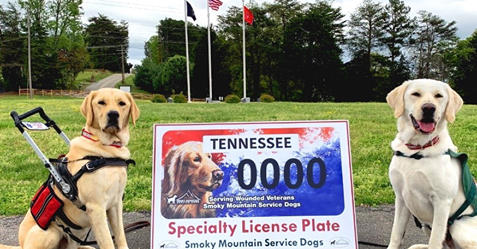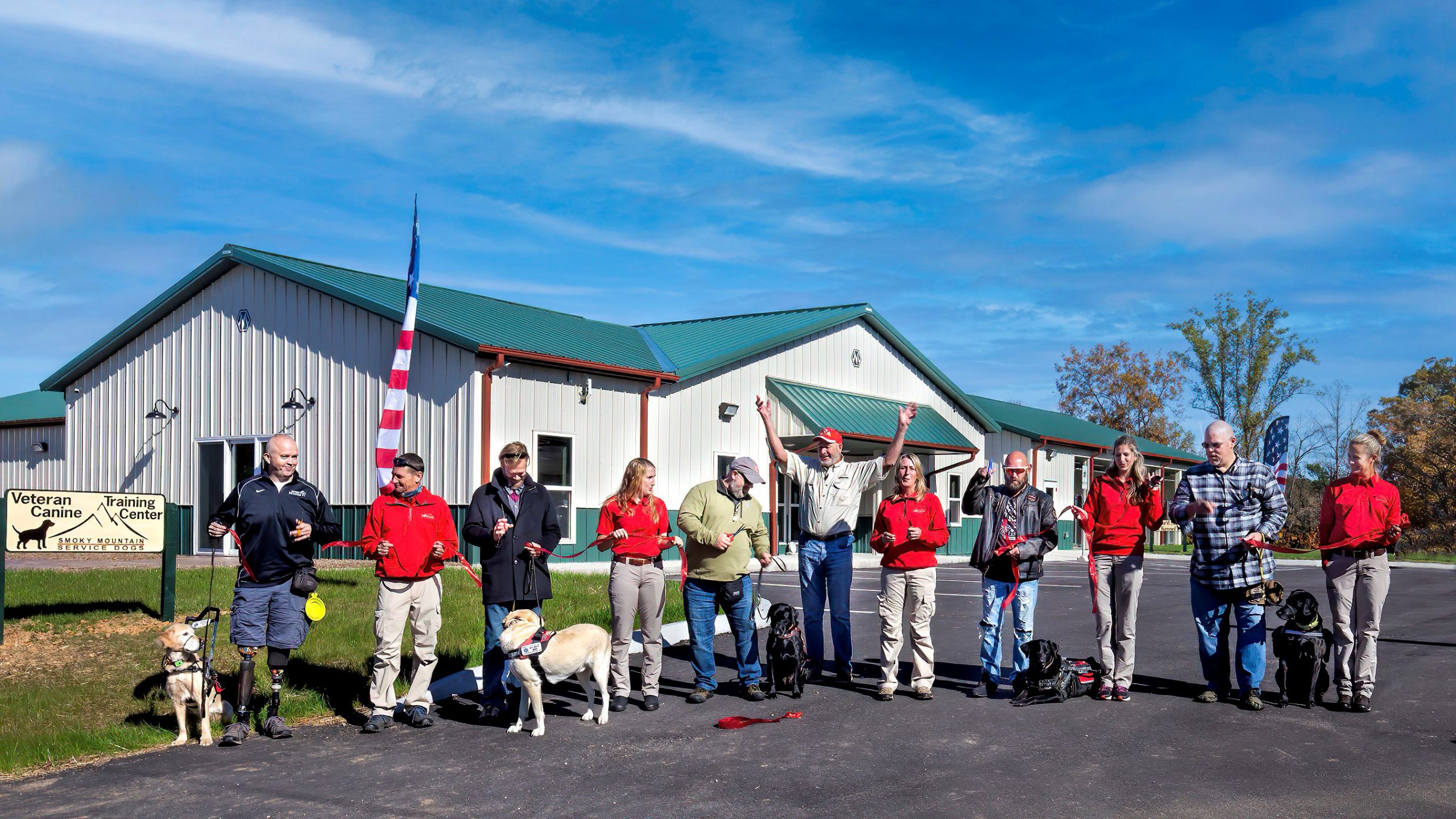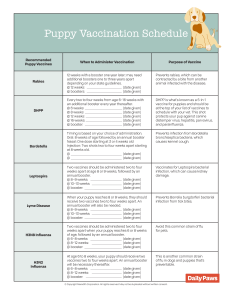To get a service dog in Tennessee, first determine your specific needs and consult a licensed professional. Then, apply through a recognized organization that trains service dogs.
How to Get a Service Dog in Tennessee: A Step-by-Step Guide
Service dogs provide essential support for individuals with disabilities, enhancing their quality of life. In Tennessee, the process to obtain a service dog involves understanding the requirements set by the Americans with Disabilities Act (ADA). These dogs are trained to assist with various tasks, such as mobility support, medical alerts, or anxiety reduction.
It’s crucial to work with reputable organizations or trainers to ensure the dog meets your specific needs. Proper documentation and training not only help facilitate your application but also ensure your service dog is legally recognized, offering you the necessary support in public and private spaces.
Table of Contents
Introduction To Service Dogs In Tennessee
Service dogs play a vital role in supporting individuals with disabilities. They provide assistance, companionship, and enhance the quality of life. In Tennessee, service dogs are defined by strict guidelines. Understanding these guidelines helps in the process of obtaining a service dog.
The Role Of Service Dogs
Service dogs are trained to perform specific tasks. These tasks help individuals with various disabilities. Some common roles include:
- Guiding individuals with visual impairments.
- Alerting to sounds for those with hearing loss.
- Providing support for individuals with mobility challenges.
- Detecting medical issues, like seizures or low blood sugar.
Service dogs undergo extensive training. This training ensures they can perform their tasks reliably. They offer independence and confidence to their handlers.
Legal Protections In Tennessee
Tennessee has specific laws protecting service dog handlers. These laws ensure equal access to public spaces. Here are some key points:
| Protection Type | Description |
|---|---|
| Public Access | Service dogs can accompany their handlers everywhere. |
| Housing Rights | Landlords must allow service dogs, even in no-pet policies. |
| Employment Protections | Employers must permit service dogs in the workplace. |
Understanding these protections is essential for service dog handlers. They ensure that individuals can live freely with their service animals.

Credit: www.reddit.com
Eligibility Requirements For A Service Dog
Getting a service dog in Tennessee involves meeting specific eligibility requirements. These requirements ensure that the partnership between the individual and the service dog is beneficial. Understanding these criteria is the first step in the process.
Qualifying Disabilities
Service dogs assist individuals with various disabilities. Here are some qualifying conditions:
- Mobility Impairments: Conditions that limit physical movement.
- Blindness or Visual Impairments: Significant vision loss or blindness.
- Hearing Impairments: Deafness or severe hearing loss.
- Seizure Disorders: Epilepsy or other seizure-related conditions.
- Psychiatric Disorders: PTSD, anxiety, or depression.
- Autism Spectrum Disorders: Conditions affecting social skills and communication.
These disabilities must substantially limit daily activities. Documentation from a licensed professional is often required.
Age And Residency Considerations
There are age and residency requirements in Tennessee. Here’s what to know:
| Criteria | Requirements |
|---|---|
| Age | Applicants must be at least 18 years old. |
| Residency | Applicants must reside in Tennessee. |
Younger individuals may need a guardian’s consent. Always check local regulations for updates.
Choosing The Right Type Of Service Dog
Selecting the right service dog is crucial. Different dogs serve unique purposes. Understanding your needs helps you find the best match.
Different Service Dog Roles
Service dogs perform various roles to assist individuals. Here are some common types:
- Guide Dogs: Help visually impaired individuals navigate.
- Hearing Dogs: Alert deaf individuals to sounds.
- Mobility Assistance Dogs: Aid those with physical disabilities.
- Medical Alert Dogs: Detect medical conditions like seizures.
- Psychiatric Service Dogs: Support mental health needs.
Each role addresses specific challenges. Choose a dog that fits your lifestyle.
Matching Dog Breeds To Your Needs
Different dog breeds excel in various roles. Consider these factors:
| Service Role | Recommended Breeds | Temperament |
|---|---|---|
| Guide Dogs | Golden Retriever, Labrador Retriever | Friendly, intelligent, and eager to please |
| Hearing Dogs | Beagle, Border Collie | Alert, attentive, and trainable |
| Mobility Assistance Dogs | German Shepherd, Rottweiler | Strong, reliable, and protective |
| Medical Alert Dogs | Poodle, Labrador Retriever | Smart, adaptable, and focused |
| Psychiatric Service Dogs | Boxer, Cavalier King Charles Spaniel | Calm, loving, and supportive |
Evaluate your needs and lifestyle. Choose a breed that aligns with your requirements.
Finding A Reputable Service Dog Provider
Choosing the right service dog provider is crucial. The right provider ensures you receive a well-trained dog. This decision impacts your quality of life. Always prioritize reputable organizations.
Criteria For Selecting A Provider
Use these key criteria to evaluate service dog providers:
- Accreditation: Ensure they are recognized by official organizations.
- Training Standards: Ask about their training programs for service dogs.
- Experience: Consider how long they have been in operation.
- Success Rate: Look for testimonials or success stories from clients.
- Support Services: Check if they offer post-adoption support.
List Of Accredited Organizations In Tennessee
| Organization Name | Type of Services | Contact Information |
|---|---|---|
| Service Dogs for America | Training and Placement | www.servicedogsforamerica.org |
| Paws with a Cause | Custom Service Dogs | www.pawswithacause.org |
| 4 Paws for Ability | Service Dog Placement | www.4pawsforability.org |
| Canine Companions | Service Dog Training | www.canine.org |
| American Service Dogs | Training & Certification | www.americanservicedogs.com |
The Application Process
Getting a service dog in Tennessee involves a clear application process. Understanding each step helps simplify the journey. Follow the guidelines below to ensure a smooth experience.
Steps To Apply
- Determine your eligibility for a service dog.
- Choose a reputable organization that trains service dogs.
- Fill out the application form provided by the organization.
- Submit your application along with required documents.
- Attend an interview or assessment if required.
- Wait for approval from the organization.
- Receive your service dog and complete training.
Documents And Information Needed
Gather the following documents before applying:
- Medical records showing your disability.
- Doctor’s letter recommending a service dog.
- Personal identification such as a driver’s license.
- Application fee if required by the organization.
Ensure all documents are current and clearly readable. This will help expedite your application process. Double-check for any additional requirements specific to the organization you choose.
Training Requirements For Service Dogs
Service dogs undergo special training to assist their handlers. In Tennessee, training focuses on two main areas: basic obedience and specific tasks. Proper training ensures that these dogs can provide the necessary support.
Basic Training Curriculum
The basic training curriculum covers essential commands. This training ensures the dog behaves well in public. Key components include:
- Obedience commands like sit, stay, and come.
- Socialization with other dogs and people.
- House training to prevent accidents indoors.
- Leash manners for controlled walking.
Training often occurs in various settings. This helps dogs adapt to different environments. Regular practice reinforces good behavior.
Specific Task Training
Specific task training tailors to the individual needs of the handler. Each service dog must perform tasks that assist their owner. Examples of specific tasks include:
- Guiding visually impaired individuals.
- Alerting to medical conditions, like seizures.
- Retrieving items for those with mobility issues.
- Providing emotional support during stressful situations.
Handlers should work closely with trainers. This collaboration ensures dogs learn tasks effectively. Consistent training and reinforcement help dogs succeed.
Financial Considerations
Getting a service dog in Tennessee involves several financial factors. Understanding these costs helps plan your budget effectively. It’s essential to be aware of the expenses involved and the available funding options.
Costs Involved In Getting A Service Dog
The initial costs of obtaining a service dog can vary. Below are the main expenses:
- Dog Purchase or Adoption: $1,000 to $5,000
- Training Costs: $500 to $3,000
- Veterinary Care: $200 to $500 annually
- Supplies: $100 to $300 (leashes, harnesses, etc.)
- Insurance: $300 to $1,000 annually
Overall, the total cost can range from $2,000 to $10,000. This range depends on the dog’s breed and training needs.
Funding And Assistance Options
Several funding and assistance options exist for service dog expenses. Here are some resources to consider:
| Funding Source | Description | Eligibility |
|---|---|---|
| Grants | Nonprofit organizations offer grants for service dogs. | Varies by organization |
| Insurance Reimbursement | Some insurance plans cover service dog expenses. | Check with your provider |
| Fundraising | Online platforms can help raise funds. | Anyone can start a campaign |
| Tax Deductions | Service dog costs may qualify for tax deductions. | Consult a tax professional |
Explore these options to ease the financial burden. Many organizations and individuals understand the importance of service dogs.

Credit: www.smokymountainservicedogs.org
Preparing Your Home And Lifestyle
Bringing a service dog into your life requires careful planning. You must adjust your home and daily routines. This ensures a smooth transition for both you and your new companion.
Home Adjustments For Accessibility
Making your home safe and accessible is vital. Here are key adjustments to consider:
- Clear pathways: Remove obstacles from floors and hallways.
- Install ramps: Use ramps for easy access to doorways.
- Secure loose wires: Tuck away or tape down cords.
- Designate a space: Create a comfortable area for your dog.
- Food and water: Set up feeding stations in accessible spots.
Integrating A Service Dog Into Your Daily Routine
Adjusting your daily routine helps your service dog thrive. Follow these steps:
- Establish a schedule: Set regular feeding, walking, and training times.
- Include your dog: Involve your dog in family activities.
- Exercise daily: Ensure your dog gets enough physical activity.
- Socialize: Expose your dog to different environments and people.
- Train consistently: Practice commands and tasks daily.
Consistency and patience are crucial. Your dog needs time to adjust. Build a strong bond through daily interactions.
Legal Rights And Responsibilities
Understanding your legal rights and responsibilities is crucial. Service dogs offer essential support. Knowing the laws helps ensure your rights are protected.
Understanding Ada Regulations
The Americans with Disabilities Act (ADA) defines service dogs. These dogs are trained to help individuals with disabilities. Here are key points about ADA regulations:
- Service dogs must be trained to perform tasks for their handler.
- Emotional support animals do not qualify as service dogs.
- Handlers must have a disability as defined by the ADA.
ADA regulations apply in many public places. These include restaurants, stores, and hotels. Service dogs must be allowed access. Businesses can only ask two questions:
- Is the dog a service animal?
- What tasks has the dog been trained to perform?
Your Rights In Public Spaces And Employment
Service dogs enhance accessibility in public areas. You have rights under the ADA:
| Right | Description |
|---|---|
| Access | Service dogs can enter all public spaces. |
| Employment | Employers must allow service dogs at work. |
| Housing | Service dogs are allowed in no-pet housing. |
Employers must provide reasonable accommodations. This includes allowing service dogs in the workplace. Report any discrimination to the Equal Employment Opportunity Commission (EEOC).
Understanding your rights ensures you and your service dog can enjoy life together. Always be prepared to explain your needs clearly.
Maintaining Your Service Dog’s Health And Well-being
Owning a service dog means ensuring their health and happiness. Regular care keeps them healthy and ready to assist you. Here are key areas to focus on for your service dog’s well-being.
Regular Health Check-ups
Routine veterinary visits are essential. Schedule check-ups at least once a year. During these visits, the vet will:
- Check vaccinations
- Examine teeth and gums
- Assess weight and nutrition
- Perform necessary blood tests
Early detection of health issues can save your dog’s life. Keep a record of all vet visits and treatments. This helps track any changes in health.
Emotional Care And Support
Your service dog needs emotional support just like you. They can experience stress and anxiety. Here are ways to provide emotional care:
- Spend quality time together daily.
- Use positive reinforcement for good behavior.
- Provide a safe space for rest and relaxation.
- Engage in regular play and exercise.
Monitor your dog’s behavior. Look for signs of stress, such as:
- Excessive barking
- Avoidance of interaction
- Destructive behavior
Address any issues promptly. Training and socialization can help improve their emotional health. A happy service dog is a better helper.

Credit: www.smokymountainservicedogs.org
Frequently Asked Questions
How Do I Qualify For A Service Dog In Tennessee?
To qualify for a service dog in Tennessee, you must have a disability defined under the Americans with Disabilities Act (ADA). This includes physical, sensory, psychiatric, or intellectual disabilities. A licensed healthcare professional can provide documentation to support your need for a service dog, which is crucial for the application process.
What Types Of Disabilities Can A Service Dog Assist?
Service dogs can assist individuals with various disabilities, including mobility impairments, visual or auditory disabilities, and psychiatric conditions like PTSD. They perform specific tasks to mitigate these disabilities, such as guiding the visually impaired or providing comfort during anxiety attacks.
Each service dog is trained to meet the needs of its handler.
Where Can I Get A Service Dog In Tennessee?
You can obtain a service dog from accredited organizations in Tennessee. Many nonprofit groups train and match service dogs with individuals in need. Research local organizations to find one that fits your requirements. Be sure to check their accreditation and training standards before proceeding.
How Long Does It Take To Train A Service Dog?
Training a service dog typically takes six months to two years, depending on the dog’s age and the complexity of the tasks required. The process involves basic obedience training followed by specialized task training for the handler’s specific needs. Consistency and socialization are key components throughout the training period.
Conclusion
Obtaining a service dog in Tennessee can significantly enhance your quality of life. The process requires patience, research, and the right resources. By following the outlined steps, you can find a service dog that meets your needs. Take action today and start your journey toward greater independence and support.



